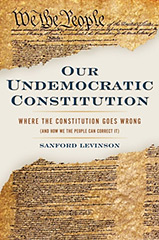Pluralities and majorities
Mort writes that he " cannot understand[my] need to dilute his argument by saying that, although George W. Bush, did not have a majority of the popular vote, neither did Bill Clinton, George H.W. Bush, Richard Nixon and whoever else. The question is not a majority of the vote, which would be nice, but a plurality - in other words, very simply, the MOST VOTES. George W,. Bush had neither the majority or plurality of the votes in 2000 but the others cited by Professor Levinson all had a pluralty."
I will be furious about the 2000 election, and Bush v. Gore, until my dying day, so I don't want to make light of his point. But I think it is a big mistake to assume that what happened in 2000 is necessarily the worst feature of the electoral college. One problem with focusing on Gore's narrow national victory (about 500,000 votes) is that we'll just never know what the result would have been had the campaign been run in a system of a single nationwide vote. That is, the election strategies are based on the electoral college itself, which explains Gore's decision to spend so much time in Florida in the last week of the campaign (as did Bush). In a truly national campaign, each would have tried to run up the national vote and return, perhaps, to their "base" states in an effort to encourage everyone to get out and vote, etc. I think we should be at least as equally bothered by the far greater statistical likelihood that we will send to the White House presidents who have ONLY plurality support, without majority support. By definition, this means that a majority of the country may well not have real confidence in him/her, including all-important confidence in his/her judgment regarding what most concerns me about presidents, which is their ability to make literally life-or-death decisions regarding war and peace. We'd be far better off with a French-type system of run-offs, or an "instant runoff system" called the Alternative Transferrable vote, used in San Francisco.
Imagine that George W. Bush had actually beaten Gore by a few votes nationally, but continued to have less than a majority of the vote (because of Nader and the other "third party candidates). I think we would have every right to be just as upset. Recall that Richard Nixon came in first, with 43% of the vote, in 1968. We'll never know, of course, who would have won in a run-off between him and Hubert Humphrey, but one can easily suspect that the consequences for the US might have been different in at least some important respects (beginning, most obviously, with appointments to the US Supreme Court).
I will be furious about the 2000 election, and Bush v. Gore, until my dying day, so I don't want to make light of his point. But I think it is a big mistake to assume that what happened in 2000 is necessarily the worst feature of the electoral college. One problem with focusing on Gore's narrow national victory (about 500,000 votes) is that we'll just never know what the result would have been had the campaign been run in a system of a single nationwide vote. That is, the election strategies are based on the electoral college itself, which explains Gore's decision to spend so much time in Florida in the last week of the campaign (as did Bush). In a truly national campaign, each would have tried to run up the national vote and return, perhaps, to their "base" states in an effort to encourage everyone to get out and vote, etc. I think we should be at least as equally bothered by the far greater statistical likelihood that we will send to the White House presidents who have ONLY plurality support, without majority support. By definition, this means that a majority of the country may well not have real confidence in him/her, including all-important confidence in his/her judgment regarding what most concerns me about presidents, which is their ability to make literally life-or-death decisions regarding war and peace. We'd be far better off with a French-type system of run-offs, or an "instant runoff system" called the Alternative Transferrable vote, used in San Francisco.
Imagine that George W. Bush had actually beaten Gore by a few votes nationally, but continued to have less than a majority of the vote (because of Nader and the other "third party candidates). I think we would have every right to be just as upset. Recall that Richard Nixon came in first, with 43% of the vote, in 1968. We'll never know, of course, who would have won in a run-off between him and Hubert Humphrey, but one can easily suspect that the consequences for the US might have been different in at least some important respects (beginning, most obviously, with appointments to the US Supreme Court).


2 Comments:
Sandy,
Thanks for writing about this topic. I just wrote about it yet again for the umpteenth time at Instant Runoff Voting Excluded: An Unreasonable Omission from An Unreasonable Man.
Perhaps the only thing more frustrating than the plurality "win" of Bush, and more frustrating than the Democrats demonizing Nader as a "spoiler" while failing to support Instant Runoff Voting is Nader's own failure to strongly promote IRV.
Feel free to leave some feedback if you like. Nice to meet you.
Professor Levinson (or others),
Just a question - what are the arguments AGAINST nationwide voting, other than the challenge of getting rid of the electoral college? We hear about how hard it would be to implement, and how no one would go for it, but in a world where the electoral college didn't exist, what complaints would we be lobbing at the system? Is there a downside?
-Erik Bergmann
Post a Comment
<< Home